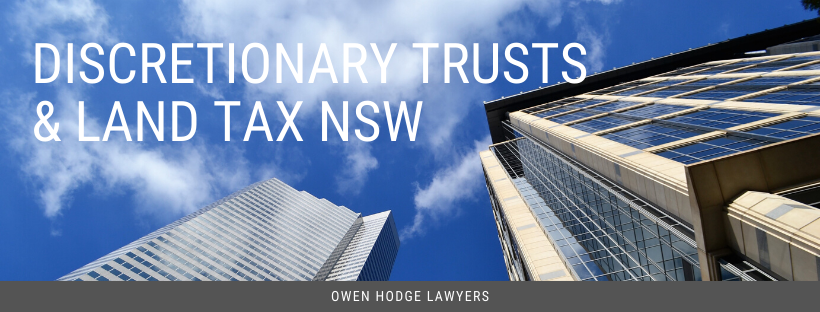This article covers the details of land tax NSW and the 2% NSW land tax surcharge, as well as the implications of both these things on discretionary trusts that own property in New South Wales. If you have any queries and require legal guidance in this matter, our tax lawyers and business trusts team can help.
Overview:
- Do I have to pay land tax in NSW?
- Discretionary trusts and the land tax NSW surcharge
- How do I avoid land tax in NSW?
Do I have to pay land tax in NSW?
Your family discretionary trust may be liable for NSW ‘’surcharge land tax’’ in the current land tax year if it owns “residential land” in NSW, and a “foreign person” is a potential beneficiary of the trust.
Many readers will be aware that the NSW Government has announced (in June 2016) that “surcharge purchaser duty” applies where a “foreign person” purchases “residential property” in NSW.
However, the NSW State Government also introduced the land tax NSW “surcharge”. This is a tax on the value of the residential property payable annually by a “foreign person” who owns residential property in NSW. It is imposed by the Land Tax Act 1956 (NSW). For the purposes of doing a land tax calculation, it is currently 2% – up from 0.75% which applied to the previous land tax year.
Definition of “foreign person”
“Foreign person” is defined in the Foreign Acquisitions and Takeovers Act 1975 (Cth) (“the Act”). The definition does not include anyone who is an Australian citizen. If they are not an Australian citizen, then it also does not include them if:
- they are “ordinarily resident in Australia” for at least 200 days in the preceding 12 month period; and
- there is no legal impediment to them continuing to stay here – for example, they are not subject to time restrictions imposed by business visas or work visas.
The bad news is that “foreign person” is widely defined.
If a shareholder is not ordinarily resident in Australia but holds a “substantial interest” in an Australian company, then that shareholder is a “foreign person”. A “substantial interest” is defined in section 4 of the Act to mean any person who, together with any one or more of their “associates”, holds at least 20% of the shares of the company. For the purpose of the land tax NSW surcharge, if a shareholder is a “foreign person”, then the company is also a “foreign person”.
“Foreign person” also includes the trustee of a trust if a beneficiary of that trust is not ordinarily resident in Australia but holds a “substantial interest” in the trust.
For trusts, a “substantial interest” means any person who together with any one or more of their “associates”, holds a beneficial interest in at least 20% of the property or income of the trust. This is easy to calculate for fixed trusts. What about discretionary trusts?
Discretionary trusts and the land tax NSW surcharge
For a discretionary trust, each beneficiary to whom the trustee has discretion to distribute income or property, is taken to have a 100% interest in the income or property of the trust. It follows that any discretionary beneficiary who is not “ordinarily resident in Australia” has a “substantial interest” in the discretionary trust. Therefore, the trustee of any such discretionary trust is likely to be deemed a “foreign person” for the purposes of the Act.
If your discretionary trust owns residential land in NSW and has a beneficiary who is not ordinarily resident in Australia, then the trustee could be a “foreign person” and liable for the NSW surcharge land tax.
Unfortunately, having a broad range of beneficiaries or a large number of beneficiaries does not change the outcome.
What if a beneficiary of your family discretionary trust (say your son or daughter) marries and moves overseas to live or work? The NSW surcharge land tax could apply.
Another example is where you, an Australian citizen, own 50% of the shares in a company which is a beneficiary of your family discretionary trust. The other 50% shareholder lives in Los Angeles. As the other shareholder owns a “substantial interest” in the company, the company is a “foreign person”.
A “foreign person” who is a beneficiary of a discretionary trust will be deemed to hold 100% of the income and property of the discretionary trust, and therefore it will be deemed to hold a “substantial interest” in the discretionary trust and therefore, the trustee of the discretionary trust will be deemed to be a “foreign person” as well. The NSW surcharge land tax could apply.
How do I avoid land tax in NSW?
Holding a residential investment property in a family discretionary trust has various advantages, including tax advantages and asset protection. They are also widely used by primary producers.
These advantages support the use of family discretionary trusts moving forward and they continue to be part of the financial armoury of anyone mindful of these issues. Accordingly, we recommend in light of the significant increase in the surcharge land tax, that trust deeds be amended to exclude “foreign persons” as beneficiaries.
There is still time to make the change. Land Tax in NSW is calculated on land holdings as at midnight on 31 December in each year so issues such as “ordinarily resident in Australia” and “foreign person” are determined by reference to each calendar year, not each financial year.
At Owen Hodge Lawyers, we always strive to provide you with the best personal and business legal advice and guidance – no matter your issue. We specialise in a range of law matters, and have a blog that offers in-depth and comprehensive articles with further information about tax including taxation of trusts Australia and more.
We can assist you with this. Feel free to call us on 1800 770 780.

